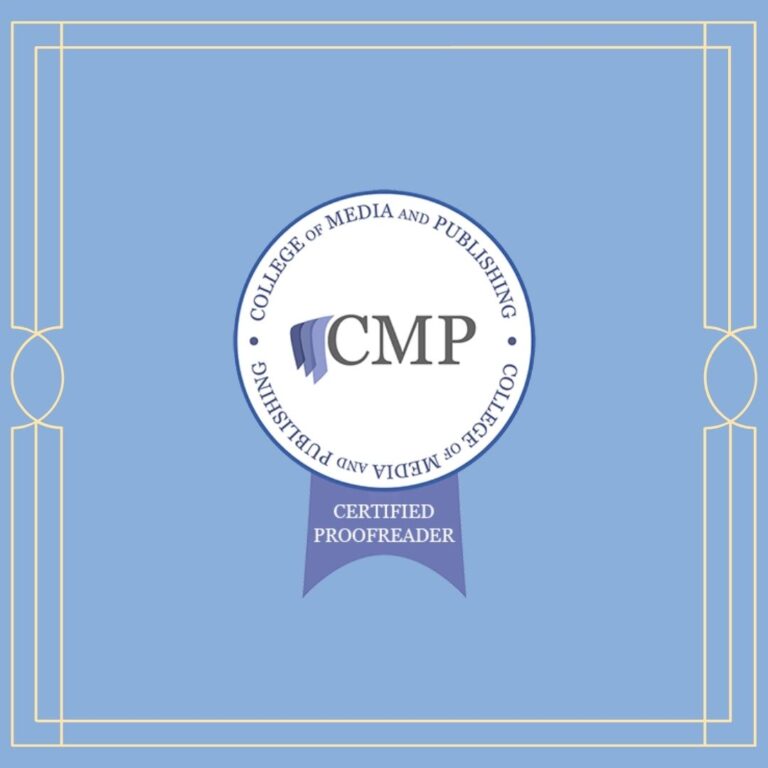As a life-long learner, and because I like to update my skills to better serve my clients, I recently completed the Proofreading and Editing Course run by the College of Media and Publishing. Whether honing my proofreading, editing or translation skills, I am totally committed to Continuing Professional Development (CPD). I believe it necessary for true professionals. Yet I also love widening my horizons, so CPD eats up much of my professional budget and not-so-spare time. If you see me turning up for one of your online webinars or courses, you have been forewarned.
Blinded By Linguistic Bias
Proofreading and polishing translations is different from proofreading a text written by a native speaker. At least it feels different to me. With translated text, even if a client only asks me to polish an English version, I prefer to see the original. It helps me produce a better English rendering and I value the insights gained by cross-checking both language versions side by side. Mistranslations abound, whether the text has been translated by non-native human writers, machines or AI. The proofreading task can turn into bilingual revision, and correcting the mistakes can take as long as translating from scratch. Or longer.
However, looking at a translated piece in its original language can also be a distraction when proofreading the final version. The task is to improve the finished target text without too much intervention. I therefore thought a new perspective on the skill would be useful. So, one of the many reasons I signed up for the Proofreading and Editing Course was to study proofreading independently of translation and bilingual revision. However, my main CPD reason was to help me clarify the distinction between proofreading and light editing. I have sometimes found this a challenge, and other colleagues have said the same. It is also an important distinction for my clients as it affects the pricing of my services. I aim to offer you the most cost-effective option for your needs.
There Is Always More to Learn
I had a wonderful time on the course. Whether studying for CPD purposes, or not, and whether related to translation, proofreading, editing, gerontology, or unconnected fields, I love learning new things and developing my knowledge and skills. In this case, the course offered all that it promised and more.
Moreover, though from the course description I thought I may have already covered much of its content in other settings, it did actually include plenty of new-to-me material. Not least, an introduction to software I have not previously used for proofreading. That was a huge bonus.
Most importantly, the course helped me reflect on my practice and weed out occasional errors that had become surreptitiously embedded in my mind. It seems I had developed some bad habits since school and university, as is inevitable. (If tempted to judge me, just think of how your driving has “developed” since you last sat a driving test.) Naturally, the point of CPD is to keep professional practice current and of a high standard, as well as to break new ground.
The Four Stages of Competence
When I worked as a hospital chaplain, a wise clinical supervisor once introduced me to the “four stages of competence”, namely unconscious competence, conscious incompetence, conscious competence and unconscious competence. The danger being that, if we learn and absorb an error, we can be blissfully ignorant of its presence. We then continue to implement it blindly at the unconscious competence stage, substituting unconscious incompetence for assumed unconscious competence. Furthermore, language changes constantly, and never more than in this digital age.
As well as helping me identify a few unknown internalised errors, working through this course reminded me that, when I studied proofreading and editing in the context of translation, I was assimilating so much new information that it was impossible for me to absorb it all. Nor to fully understand its implications. So, refreshing previous learning also deepened some of my prior knowledge, and made it more automatic. The knock-on effect is, of course, to speed up my work, as well as to improve it. Another benefit for my clients.
It just proves how important it is to keep learning and studying. CPD is so important for translators and proofreaders. Even more so when handling academic and literary texts. Academics are always learning and pushing boundaries. We should be too.







